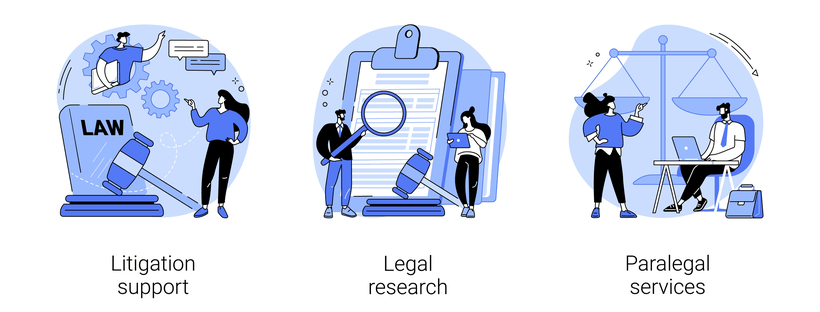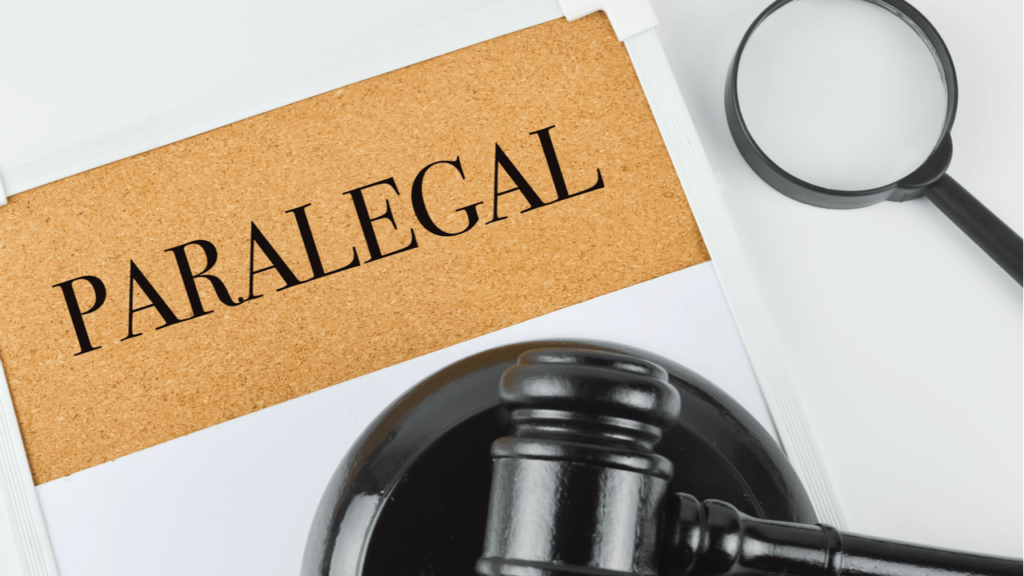A paralegal is a person who is certified through education, work experience, and training to perform legal work. Paralegals need to have a knowledge of the law and the related legal concepts. A licensed paralegal can be hired by a lawyer, a law firm, government agency or any other entity authorized by statutory, administrative, or court authority. Paralegals generally act as the support staff in law firms and can also be self-employed legal services providers. They can also directly assist a single attorney.
Being a paralegal requires a lot of research and paperwork. They also provide advice to lawyers in court. The demand for paralegals is growing tremendously as they are required in almost all the offices where legal work is carried on.
For making a successful career as a paralegal, it is important to find the right educational programme that fits your career goals. There are various paralegal courses in Canada that act as a pathway to a progressive paralegal career and train an individual in accordance with the paralegal rules of conduct. In this blog, we will look at some of the top paralegal courses in Canada, their eligibility criteria, and the admission process.

Choose your dream country
When do you want to study abroad?
What's your highest level of education?
Select you current city
How Leap will help you
Personalised University Shortlist
Express Applications with Quicker Admits
End-to-End Application Support
Why Study Paralegal Courses in Canada?
Canada is one of the top study abroad destinations for international students, especially students from India. The universities in Canada are known for their high-quality education system and top-ranked paralegal courses. Some of the reasons to study paralegal courses in Canada are described below:
- Canada offers top-class education facilities and courses. Some of the top-ranking universities are there in Canada, offering specialized programmes for overseas students.
- There is a huge demand for paralegals in Canada in different areas of law, including legal research, compiling documents, consulting clients, and filing legal documents or correspondence in courts. They are especially in high demand in Nova Scotia and Manitoba.
- Paralegals earn a handsome salary in Canada, with their average salary being 72565.62 CAD. Experienced professionals can earn up to 93228.44 CAD.
- Canadian universities focus on developing practical skills by implementing theory knowledge. They also enhance the communication skills of a student by exposing them to a diverse set of people.
Admission Process for Paralegal Courses in Canada
The general admission process for the paralegal courses in Canada are:
- Choose 1 to 3 related programmes of your choice as per the program availability in the university or college.
- Fill out the International Education Application Form available on the college website.
- Take the English Language Proficiency Exams such as TOEFL or IELTS.
- Scan the copies of your transcripts, English language test scores, and other application documents and mail them to your designated International Admissions Team based on your region.
- You can check your application status by contacting your Regional Admissions Team member or online with the help of your email ID and password.
- Receive an acceptance or offer letter from the university, and deposit the tuition fees before the deadline.
- Apply for a study permit or study visa and give the visa interview.
- After the approval of your study visa, complete your registration in person at the campus.
Top Paralegal Courses in Canada
Some of the top paralegal courses in Canada, the universities offering them, their admission requirements and tuition fees are listed below:
1. Graduate Certificate in Paralegal at Centennial College
Graduate Certificate in Paralegal at Centennial College is a programme of 1 year offered on a full-time basis. The college was ranked among the top 10 Canadian Research Colleges. The university has an on-campus mock courtroom that provides students with opportunities to practise being a paralegal in mock trial and moot court competitions. The college boasts an employment rate or a field placement rate of about 80 per cent. The program makes use of technology such as Quicklaw, PCLaw, and various other legal research tools.
Eligibility Requirement
The aspirants of the programme must meet the following entry requirements before getting admission:
- The students must have completed a 2-year college degree or diploma programme in any field with a first class from recognised institutions.
- The student must have a minimum of two years of work experience in a legal or a related field.
- English Language Proficiency
TOEFL score - A minimum of paper-based 580 scores and 88+ minimum for the Internet-based test.
IELTS Academic - 6.5 IELTS band score with no less than 6.0 in any paper
Tuition Fees
For international students, the approximate fee for the program is $23,078.25; there is an ancillary fee of $2,133.86, which is the fee charged for activities and support services for the institution.
2. Paralegal Graduate Certificate Program at Fanshawe College
Fanshawe's Paralegal Graduate Certificate Program is accredited by the law society of upper Canada. Upon successfully completing the programme, an individual can obtain a paralegal license by passing a licensing examination. The programme covers the scope of practice of a paralegal, court proceedings, administrative law and trains an individual on how to behave in a legal environment. The related paralegal programmes at the Fanshawe college include:
- Fanshawe's Law Clerk program
- Law Clerk (Co-op) program
- Fanshawe’s Advanced Police Studies
- Court Support Services program
Eligibility Requirement
The requirements for admission to the college for international applicants are as follows:
- A college diploma in a related legal area
- A university degree or equivalent qualification from an institution.
- English proficiency can be demonstrated by a TOEFL score of a minimum of 88 for the internet-based test (iBT).
Tuition Fees
The total fee for the Fanshawe College Graduate Certificate Program for international students is $15,641. In addition to the same, a student also has to pay for the health and dental plan fee, travel expenses, and other general expenses.
3. Bachelor of Paralegal Studies at Humber College
Humber’s Bachelor of Paralegal Studies is a four-year programme that combines legal theory with practical applications. The course covers ethics and professional responsibility, evidence, negotiation and mediation, advocacy, consumer law, contract law, tort law, employment law, and insurance law. The college also offers scholarships and bursaries for international students to finance their education.
Eligibility Requirements
The admissions for the course usually starts in September, and the eligibility requirements are as below:
- A minimum score of 6.5 in the IELTS examination
- Grade 12 official transcripts and scores
- High school certificate
- Financial and bank statement
Tuition Fees
The fee for international students for the 2022 to 2023 session is $19,615.00. It includes an ancillary fee, co-op or placement fee, and the student union fee.
4. Diploma in Paralegal (PARA) at Loyalist College
The two-year Ontario College Diploma programme offers training in substantive law and legal procedures. Over the four semesters, the students are taught legal research and writing memoranda and reports, legal accounting, evidence and litigation process, residential landlord and tenant law, tenant board matters, and common law to make them eligible to work in legal departments or administrative tribunals.
Eligibility Requirements
To secure admission in this paralegal program, a student must fulfil the following criteria:
- Grade 12 English (C) level or equivalent
- 10 + 12 official transcripts, with marks over 50%, and a bachelor's degree from a recognised institution with less than eight backlogs
- IELTS score: 6.0 overall with no band less than 6.0
- Cambridge English Exam - C1 Advanced or C2 Proficiency
Tuition Fees
The total fee for the program for two semesters is approximately $16,468.50. This includes a tuition fee of $14,332.50, a full-time ancillary fee of $1,536, and mandatory health insurance of one year for $600.
5. Paralegal Ontario College Graduate Certificate Program at Algonquin College
The Paralegal Ontario College Graduate Certificate programme spread across three semesters prepares you to apply to the Law Society of Ontario (LSO) to enhance your permitted scope of paralegal practice by becoming a licensed paralegal. The programme deals with the legal terminology, the conduct of small claims court, alternative dispute resolution (ADR), practice management or operating a small business, and provincial offences or motor vehicle offences.
Eligibility Criteria
The eligibility criteria for the graduate certificate programme at Algonquin College is:
- Ontario College Diploma, Ontario College Advanced Diploma, a Degree or equivalent.
- Ontario Secondary School Diploma
- IELTS Academic - Overall 6.5 band score, with a minimum score of 6.0 in each band.
- TOEFL score for Internet-based test (iBT) - A minimum overall score of 88, with a minimum of 22 in each component: reading, listening, speaking, and writing.
Tuition Fee
The estimated programme fee for three semesters will be $20,557.90. In addition to this, textbooks can cost approximately $1,000 per term. These costs do not include travel and other general expenses.
Other top paralegal courses in Canada include:
- Paralegal (graduate certificate) at Durham College
- Honours BSocSc In Conflict Studies And Human Rights at University of Ottawa
- Paralegal Ontario College Graduate Certificate Program at Georgian College
- Ottawa Paralegal Course at Herzing College
- Paralegal (Accelerated) (PLEA) Program and Paralegal (PLE) Program at Seneca College.

Conclusion
Paralegals are legal professionals who assist lawyers in their various court processes. Though they have extensive legal knowledge, paralegals do not have the license to practice as lawyers. They can either work independently or collaborate with lawyers. The median wage of a paralegal in Canada is $ 28.02 per hour. The lowest wage per hour can be $18.00, while the highest per hour wage can be $45.67. Top Canadian law firms include Borden Ladner Gervais LLP, Gowling Lafleur Henderson LLP, Fasken LLP, Norton Rose Fulbright LLP, Blake, and Cassels & Graydon LLP.
LeapScholar can help you study in Canada to become a paralegal by identifying the best university for paralegal courses in Canada and guiding you throughout the entire admission process
Frequently Asked Questions
What are the job prospects for a paralegal in Canada?
A paralegal in Canada can work in the legal system after obtaining a license from the law society. Graduates are qualified to work as:
Advocates on a fee for service basis can work to represent clients in provincial offences court, small claims court, criminal court, or before administrative tribunals.
A junior paralegal can work in government institutions on a starting salary of about $45,000 to $48,000.
Paralegals can also be a part of the legal teams that support lawyers in cases.
After a bachelor's degree, a paralegal can work in in-house training in law firms.
They can also work in public notaries.
What are courses related to the paralegal field?
Some of the related courses of the legal profession are as follows:
Justice Administration Services Program
Office Administration - Legal Program
Bachelors of Arts In Law And Society
Court Support Services Program
Advanced Police Studies
How do I become a paralegal in Canada?
You can opt for a career as a paralegal in Canada by following these steps:
1. Research for the role, duties, and available educational and professional opportunities in your area.
2. Obtain the required education from a recognised university. You can opt for a paralegal certificate, which is the shortest route to become a paralegal in Canada, an associate degree, a bachelor's degree, or a postgraduate paralegal certificate as per your aspirations.
3. Gain practical experience through internships or on-the-job training.
4. Satisfy the licensing requirements as per your province, which usually includes completing a licensing examination, satisfying the character requirement, and finally applying for your licence within a duration of 3 years.
5. Gain additional certifications in the field. Many provinces such as British Columbia offer designated titles and voluntary certifications to paralegals who practice within their jurisdiction.
6. Create a resume and find a paralegal job.















Have Questions? Get Guidance to reach your Dream University
Connect with India's finest counsellors and biggest study abroad community.
Get Guidance